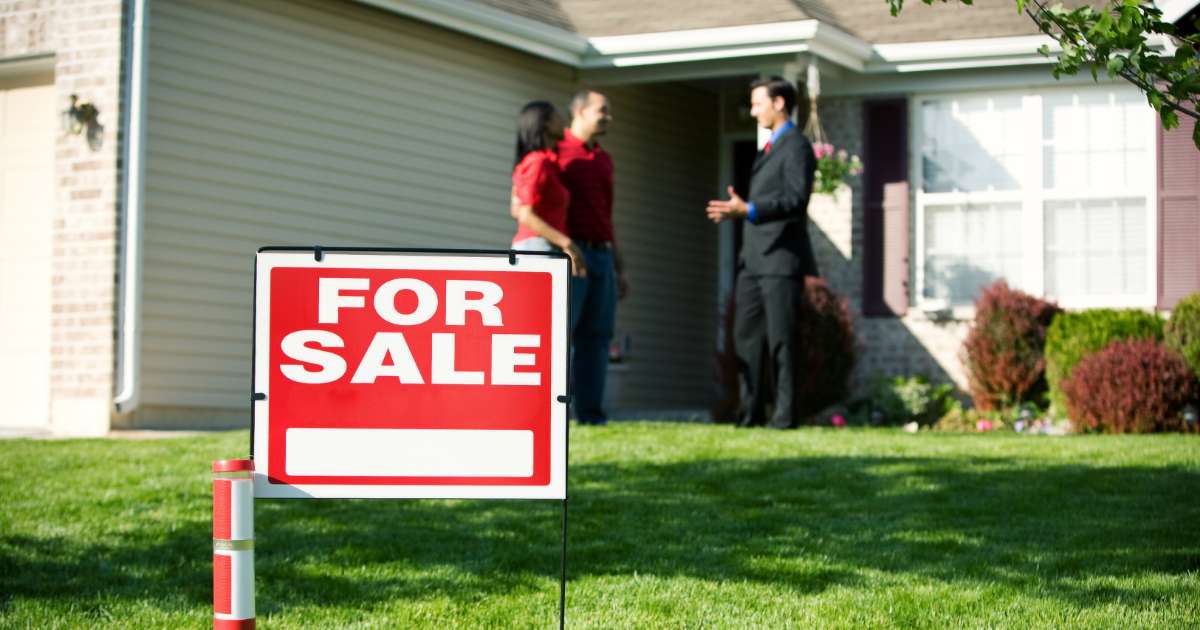How do you want to sell your Tampa Bay house?
You have several choices when thinking about how you want to sell your house—working with a real estate agent, selling FSBO (for sale by owner), selling to an iBuyer, or working with an off-market home buyer. They each follow a different process. We’ve broken it all down into easy-to-follow steps.
Steps to sell with a real estate agent or FSBO
The most traditional way to sell a house is to work with a real estate agent. A good agent can help you set the price for your house, handle all the marketing, negotiate with interested buyers, and walk you through the closing process. You can usually get a better price with a real estate agent because they know the market and have experience selling houses.
When you sell your house For Sale By Owner (FSBO), you handle the entire sale yourself. This approach helps you avoid commission costs and gives you more control. The potential downside is that you’ll be on your own without any expert advice, and the process can take a lot of time and effort. You’ll handle all legal and financial parts of the sale, too.
Both of these options have the same general checklist for selling a house, although the levels of time and effort you’ll spend can be different.
- Pick a real estate agent. It’s important to choose a real estate agent with experience and good online reviews. You can interview multiple agents to get an idea of which one you’d work best with. A seller’s agent historically costs around 2.5%–3% of the house’s sale price. Skip this step if you’re selling FSBO.
- Have your home inspected. You don’t legally need to have a home inspection in Florida when you’re selling a house, but it’s a good idea to find out what’s wrong with the house before you start the process since the buyer will typically request one anyway. Then, you can decide what to fix, what to leave alone, and what issues you need to disclose to a buyer. Home inspections cost around $250–$500 in Florida, according to Houzeo.
- Set your repair budget. Now it’s time to decide what repairs you want to make before you put the house on the market. If you’re working with a real estate agent, they can help you figure out which fixes and upgrades are most likely to get you a better selling price. A seller’s disclosure form isn’t legally required, but you and your real estate agent do need to tell potential buyers about anything that’s significantly wrong with the property if it’s something that can’t be easily seen, like outdated electrical systems or plumbing issues.
- Prepare and price the house. After deciding what you want to fix, you can get started on preparing your house for sale. This can include small cosmetic changes like a new coat of paint on the walls, or bigger upgrades like a new water heater. Once you’re done with repairs, you can decide on a price for your house. If you’re working with a real estate agent, they can help a lot with this part. They should know the local market and be able to give you a good idea of what you’re likely to get for your house.
If you’re selling FSBO, you can do the research yourself by visiting real estate websites to see what price similar properties have sold for. You can also get a broker price opinion (BPO) or a pre-listing appraisal. For a BPO, a real estate broker or real estate firm will estimate the value of your house based on their inspection of the property, while a property appraisal is done by a licensed appraiser. Property appraisals in Tampa Bay can cost anywhere from $250–$500 depending on the size of the house, according to Houzeo. A BPO is usually about half the price of an appraisal. - Stage the house. Part of staging the house involves cleaning, organizing, and getting your furniture placed so that the house looks as nice as you can make it. If you don’t have enough furniture or don’t like the furniture you do have, you can rent some to stage the house instead. A real estate agent can help with the staging step of getting your house ready to sell, or you can handle it yourself by contacting a furniture rental company in Tampa Bay.
- Get a photographer. Having nice, professional photos in your listing will attract more potential buyers. Your real estate agent can provide you with some references for photographers. You can also take the photos yourself, but professional-quality photos will be more appealing to buyers. These photos will be the hook that draws in buyers to view the house in person.
- List your house. The Multiple Listing Service (MLS) is a database that real estate agents use to help their clients who are either buying or selling houses. Your agent will list your house on this database so that other agents can find it and recommend it to their clients who are looking to buy a house. If you’re selling FSBO, you can list the house yourself on various real estate websites, put a For Sale sign in your yard, and advertise around your neighborhood.
- Have showings and/or open houses. During showings and open houses, potential buyers have a chance to check out the house in person. Your real estate agent can set these up for you and conduct both the showings and open houses without your involvement. If you’re selling FSBO, you’ll need to schedule appointments with buyers yourself and advertise any open houses you want to host. During a showing, you can guide the potential buyer around and let them know about all the features of the house. With an open house, you’ll set a time range during which buyers can come over and tour the house.
- Negotiate with interested buyers. After the showings, you may get some offers from people who want to buy the house. A real estate agent will help with negotiations to get you the best price possible. When selling FSBO, you’ll need to consider the bids and negotiate with buyers. There are a few tactics you can use to get a good price. Accept offers only after you’ve hosted at least one open house. Potential buyers who see others considering the house may assume that their offer is one among many, so they could raise their offer to stay competitive.
- Close the sale. In Florida, you’ll need some paperwork to sell a house FSBO. This includes an affidavit of title, which says that you own the property and are able to sell it, and the deed to the property. You’ll also need property tax records and a 1099-S tax form. This form is legally required to report the profit you made on the house for tax purposes. You’ll then summarize all the costs and credits involved in the home sale in a settlement statement. You can find FSBO forms for a Florida purchase agreement and seller disclosures online. If your house has lead-based paint, federal law requires that you include a Lead Warning Statement in the contract as well. If you’re selling with a real estate agent, they should be able to guide you through getting and filling out all of this paperwork.

Selling your house to an iBuyer
iBuyers make immediate offers on houses and can be a good option if you want a quick, straightforward, and less personal sale. The price you’ll get from an iBuyer is usually lower than what you’d get if you went through the process of selling on the traditional market.
- Check the selling prices of homes near you. First, you can look at online listings for similar houses in your area to get an idea of how much your house is worth. Factor in the repair and renovation costs for any fixes you plan to make around the house, and you’ll arrive at the approximate value of your home. You can also get an appraisal to find out its value. Remember that you probably won’t get that price from an iBuyer because they’re buying your house at a discount, but knowing how much the home is worth can help you decide whether the trade-off of a quick sale is worth the lower price.
- Request an offer. Look online for iBuyers that buy houses near where you live. You may be able to find information about what type of houses each one wants—some companies buy more houses that are older or not in great shape, and others want newer homes with fewer repairs needed. You’ll be asked for some information about the house, which can include the street address, the property type, and how much land is included with the house.
- Get your offers. After getting some offers from a few different buyers, you can compare the numbers to the one you came up with in the first step. Then, you can decide whether you’re willing to continue the process, or if you want to sell another way.
- Have an in-person house inspection. An iBuyer will want to send someone out to see the house before making an official offer. After this inspection, they may lower the originally quoted price if the house needs repairs or renovations. They may also ask that some repairs be made to the house before they’ll buy it.
- Consider the offer and choose to accept or reject it. Things can move fast when you’re selling to an iBuyer, so it’s always a good idea to talk to people you trust before signing a contract. Most iBuyers will charge a fee when you sell to them, usually a percentage of the sale price, so be sure to find out how much they charge before signing anything. Usually, you won’t have much room to negotiate, since their goal is for you to sell your house quickly, not get the highest price. You might not need to make repairs, though, since many iBuyers are willing to buy the house in its current condition.
- Close on the home sale. If you’re working with a good iBuyer, they should be able to help you with paperwork and legal details of the sale. You can generally close fast on the house. Consult with a real estate attorney if you need help with the contract or have any questions about it.
How to sell your house to an off-market buyer in Tampa, St. Petersburg, or Sarasota
Off-market home-buying combines speed and ease with a more personal touch. There are fewer steps than selling with a real estate agent or FSBO, and you may get a higher price for your house than with an iBuyer because an off-market home buyer will likely not charge as many fees.
- Research similar home sales around you. It’s a good idea to take a look at some houses like yours that have recently sold in your area. When you check these prices, you’ll be able to get an idea of how much your house is worth and what kind of offer you’re willing to accept. Remember to consider any repairs or renovations needed and factor that into the number you’re hoping for.
- Check out a few different off-market house buyers. Shop around for your home buyer. Some will have better terms and conditions than others. Look for a company or individual with online reviews, testimonials, or references to make sure they’re legitimate.
- Have an in-home consultation. Once you’ve found a buyer or two with a good reputation, schedule an appointment for them to see the house. Someone will come over to check out the property and determine how much they’re willing to offer. You can skip any repairs and renovations. Off-market house buyers will typically make an offer on the home “as is.”
- Think over the offer and accept or reject it. After your in-home consultation, you can receive an offer. Consider it carefully, and consult with family and friends you trust. Take your time on this step, and reconsider if the home buyer pressures you to sell quickly. Read the fine print of any contract before accepting the offer, since some home buyers charge fees while others don’t.
- Close the sale. Reputable companies that buy houses should be able to explain the process of selling in detail, but if you aren’t comfortable signing the contract without help from a professional, you can hire a real estate attorney to look it over for you first. You’ll usually be able to close fast with this type of buyer.
Sell to We Buy Ugly Houses® for a hassle-free sale.
If you’ve decided that selling your house to an off-market home buyer is the way to go, consider working with We Buy Ugly Houses® in Tampa Bay. Our friendly franchisees live and work in your area, so they’re familiar with local markets and the community. We can give you a convenient offer on your house “as is”—no repairs, renovations, or cleaning needed. You can even leave unwanted items in the house, and we’ll take care of them for you.
You won’t pay any hidden fees, typical closing costs, or commissions when you sell to us, and we do our best to close on your schedule. Our offers are typically discounted below market value in exchange for speed and convenience. We have a 95%* customer satisfaction rating nationwide and excellent reviews because we’re committed to providing top customer service. Get in touch with us to schedule an in-person consultation at your house and start your fast and easy home sale.
This blog is for informational purposes only and should not be considered legal advice.





